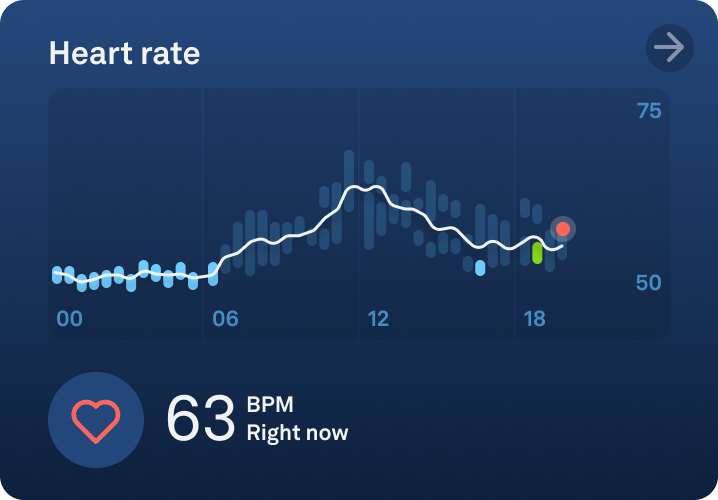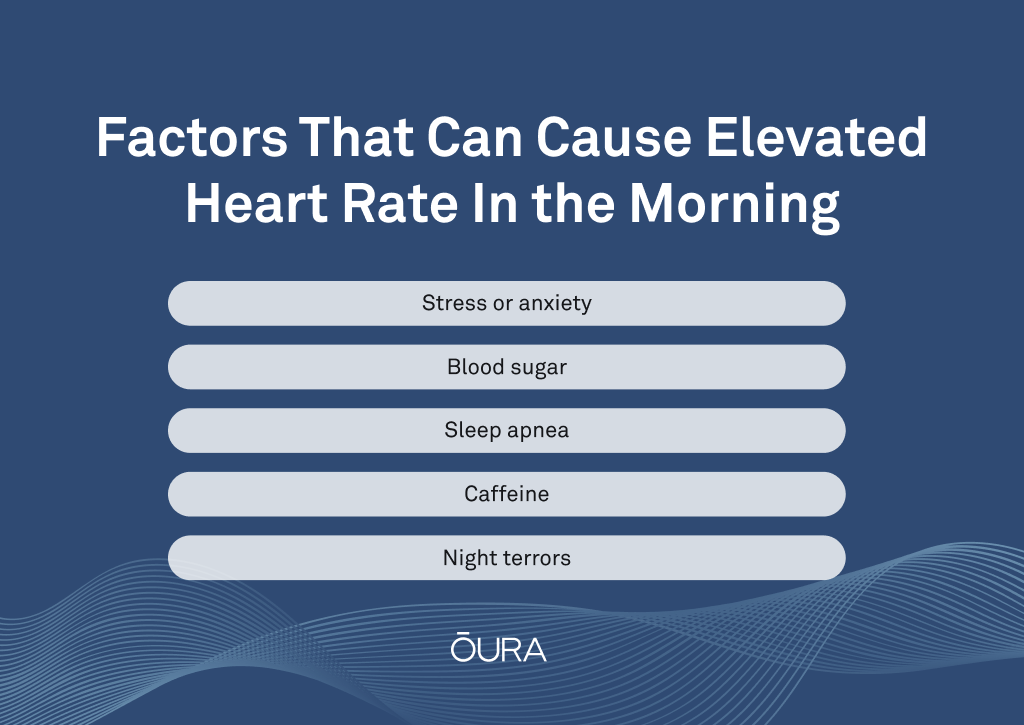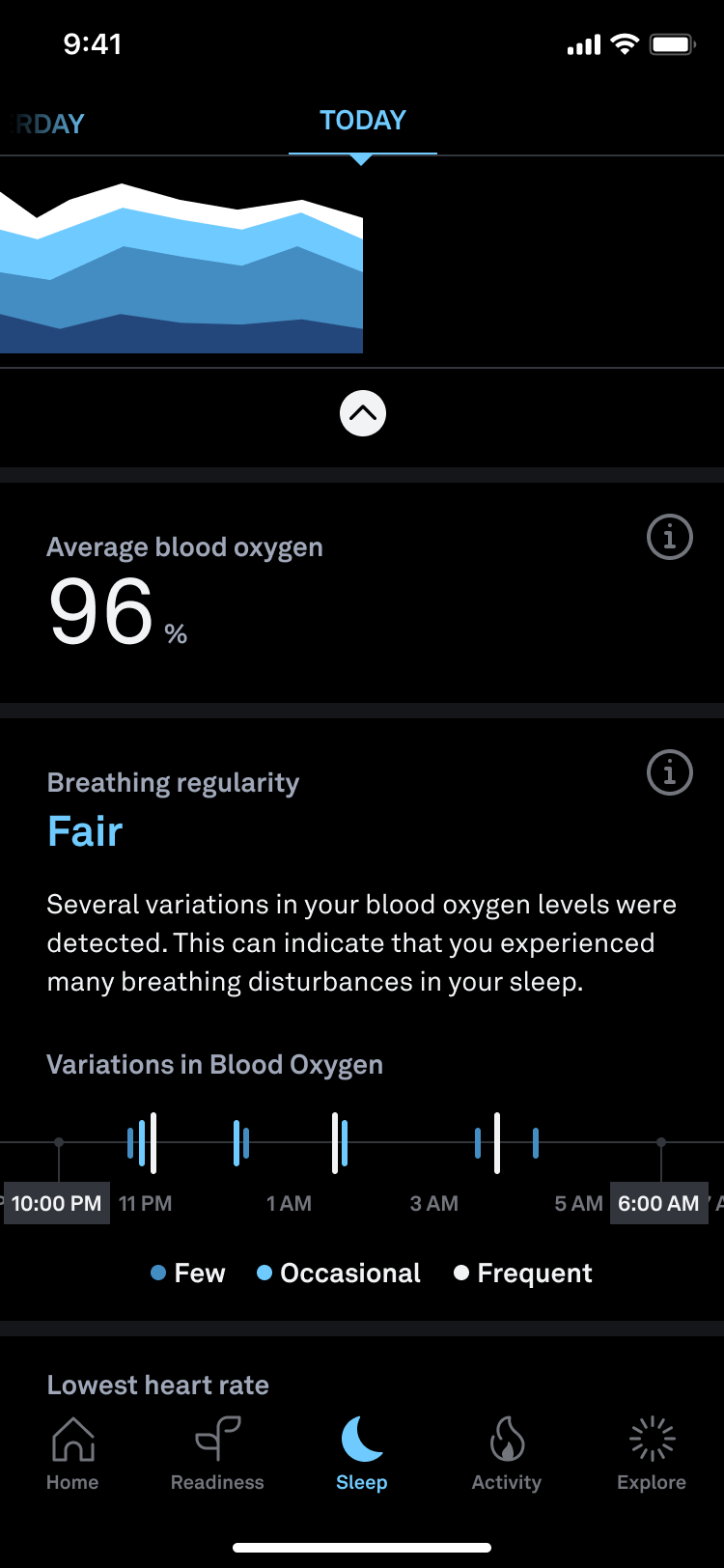- Why does my heart race when I wake up? An elevated morning heart rate can be caused by factors such as stress, anxiety, blood sugar levels, sleep apnea, caffeine consumption, and night terrors.
- Managing a high heart rate involves practices like maintaining good sleep hygiene, staying hydrated, practicing deep breathing, and avoiding stimulants.
- Track your live heart rate using Oura, and access other features that can paint a picture of your overall heart health, like Cardiovascular Age and Cardio Capacity.
Heart health is vital for overall health and wellness. At its core is your heart rate, which indicates how well your cardiovascular system is working. Heart rate refers to the number of times your heart beats per minute (bpm).
While the normal range varies from person to person, an adult’s resting heart rate typically falls between 60 and 100 bpm, according to the American Heart Association. Athletes and people who engage in regular physical activity may have a heart rate as low as 40 bpm.
Occasionally, you may notice a higher heart rate than your baseline in the morning — whether in your Oura data or just based on your heart beating in your chest. Although this can be disconcerting, it’s not always a cause for alarm.

With the 24-hour heart rate graph, Oura members can gain immediate insights into their heart rates and track any fluctuations over time. The graph comes with the Live Heart Rate feature, which gives you real-time feedback on your heart rate and allows you to monitor its rhythm at any time with a simple tap.
Note: While an occasionally higher-than-normal heart rate can be normal, it’s a good idea to remain attentive since, in some cases, the symptoms might indicate a need for some medical attention to ensure your well-being.
| Member Tip: Gain further insights into your overall heart health by using Oura’s new heart health features: Cardio Capacity and Cardiovascular Age. By monitoring your heart rate, you can better understand your heart’s efficiency, and uncover factors that may contribute to an elevated heart rate in the morning. |
Why Does My Heart Race When I Wake Up? 5 Reasons For an Elevated Morning Heart Rate
Many factors can cause your heart to beat very fast in the morning. Five of the most common reasons include the following:

1. Stress or Anxiety
Stress or anxiety can significantly impact your body, including your heart rate. In fact, research suggests that around 31% of heart palpitation cases can be attributed to mental factors such as stress, anxiety, or internal conflicts. In particular, acute stress (caused by a situation like an argument, taking a test, or working under pressure) is more likely to make you notice an elevated heart rate in the morning. This is because the effects of stress are directly linked to both the cardiovascular and the autonomic nervous systems.
Stress can also increase heart rate, causing the heart muscle to contract more strongly to send blood to the rest of the body. The stress hormones cortisol, adrenaline, and noradrenaline act as messengers for these effects.
On the other hand, the autonomic nervous system — which is divided into the sympathetic nervous system (SNS) and the parasympathetic nervous system (PNS) — plays a direct role in the physical response to stress. When you’re stressed, the SNS signals the body to release cortisol and adrenaline. Together with the autonomic nerves, these hormones cause the heart to beat faster to help deal with the stress.
| Member Tip: Keep a close eye on your stress levels by looking at the Daytime Stress card. The Resilience feature will give you an insight of how you’re balancing your daily stress levels with your recovery. |
2. Blood Sugar
Blood sugar levels can influence heart rate. For example, one of the symptoms of high blood glucose, or hyperglycemia, is a rapid heart rate. On the other hand, low blood sugar levels can increase the risk of arrhythmia, or irregular heartbeat. When blood sugar drops, the body releases epinephrine, a hormone linked to the “fight-or-flight” response, which can affect heart rate.
It’s important to note that processed sugar isn’t the sole culprit for palpitations. Refined carbohydrates, such as white bread or pasta, can also have a similar effect, especially for individuals with diabetes.
RELATED: Oura Now Integrates with Continuous Glucose Monitors (CGMs)
3. Sleep Apnea

Sleep apnea, a sleep disorder characterized by interrupted breathing during sleep, can have a significant impact on heart rate. Obstructive sleep apnea, the most common type, occurs when the muscles in the throat relax, leading to a narrowed or closed airway.
Studies have shown that sleep apnea increases the risk of an irregular heart rate — the abrupt drops in blood oxygen levels during sleep apnea episodes can cause high blood pressure and a fast heart rate.
If you experience symptoms such as loud snoring, gasping for air during sleep, trouble sleeping through the night, dry mouth upon waking, or morning headaches, it may be worth discussing the possibility of sleep apnea with a healthcare professional.
Can Oura Ring Detect Sleep Apnea?
Oura is not intended to diagnose medical conditions, but people who have sleep apnea may see lower than normal blood oxygen levels in the Oura App, as well as reduced REM and deep sleep, which may be reported as excessive awake time in their sleep graphs.
4. Caffeine
Caffeine, a widely consumed stimulant found in products like coffee, tea, and cacao plants, can contribute to an elevated heart rate in the morning, especially if consumed close to bedtime. This is because about half of the caffeine you consume can still be present in your body six hours later, and it may take up to 10 hours for your bloodstream to completely clear all the caffeine.
Drinking too much caffeine can cause other side effects, including irritability, trouble sleeping, shakiness, and frequent urination.
| Member Tip: Curious about how caffeine affects your sleep quality? With Oura Tags, you can track how factors, such as caffeine consumption, impact your Sleep Score and Readiness Score, making it easier to adjust your habits and lifestyle choices. |
RELATED: 10 Effective Coffee Alternatives
5. Night Terrors
Night terrors, also known as sleep terrors, are a sleep disorder that causes intense fear while sleeping. They usually occur during non-REM sleep, specifically during the deepest stage of sleep.
Unlike nightmares, when you experience night terrors, you may find yourself unresponsive to any attempts at comfort. It’s also common to have little to no memory of the terrifying event once you wake up. Night terrors often leave you feeling exhausted, stressed, and confused afterward, and they can cause you to wake up in a state of panic, with your heart beating rapidly.
RELATED: What Causes Period Nightmares? The Science Behind Bad PMS Dreams
What To Do About a High Heart Rate in the Mornings
The following steps can help lower a high heart rate in the morning and start your day on a calmer note.
- Rest and relax for recovery: Prioritize rest and allow your body to recover by getting plenty of sleep. Establishing good sleep hygiene practices, such as maintaining a consistent sleep schedule and creating a relaxing environment before bedtime, can significantly contribute to unwinding and improving the quality of your sleep. A good night’s sleep, particularly during the REM (rapid eye movement) stage, can help reset your mental state. REM sleep is crucial for mental and emotional processing, and its positive impact on your well-being can extend to regulating heart rate.
| Member Tip: Oura can help you effectively track your sleep quality and sleep cycle trends. Your Sleep Score will show you how well you’re sleeping, including whether or not you’re getting enough sleep in each sleep stage. Moreover, it helps you uncover how to improve your sleep quality. |
- Stay hydrated for heart health: Dehydration can contribute to an increased heart rate, so it’s important to keep your body adequately hydrated. Remember to drink enough fluids (for example, water or herbal tea) throughout the day, especially during illness, to support optimal hydration levels.
- Harness the power of deep breathing: Regularly practicing deep breathing exercises and meditation techniques can be a powerful way to promote relaxation and lower your heart rate. Oura members can use Explore content to access guided breathing exercises and incorporate them into their daily routines.
| Member Story: Member Misha Y. has firsthand experience with the calming effect of these guided meditations, which he began using before work and in between meetings. “I noticed an increase in calmness, and my heart rate would drop a few beats,” he says. |
- Avoid stimulants: Stimulants like caffeine and nicotine can significantly impact heart rate. It’s advisable to reduce your intake of these substances, especially in the hours leading up to bedtime. Caffeine, in particular, acts as a stimulant and diuretic, meaning it can increase heart rate and contribute to dehydration.
When To See a Doctor
An elevated heart rate during your mornings can be an unsettling experience, but in most cases, it may not warrant immediate medical attention. However, there are situations where seeking medical evaluation is crucial. For example, it’s important to get medical attention for your high heart rate if you:
- Have a history of heart disease or your palpitations worsen.
- Experience symptoms of a heart attack. These symptoms may include shortness of breath, dizziness, and chest pain.
RELATED: Member Ted N. Used his Oura Data to Detect an A-fib Episode





